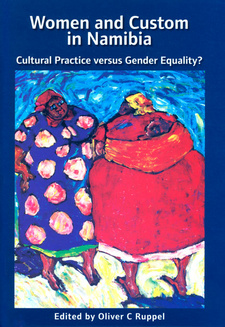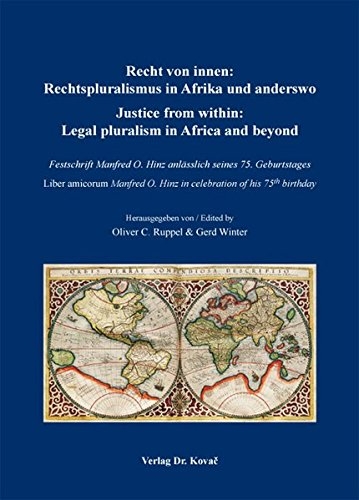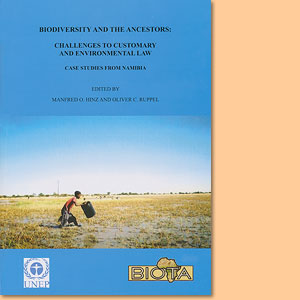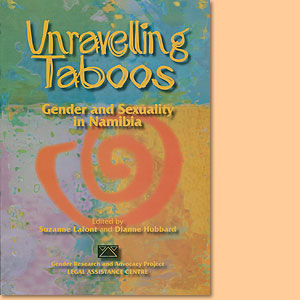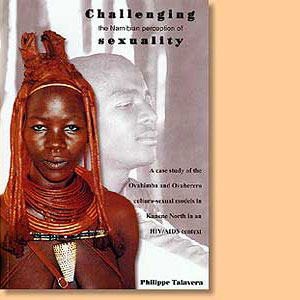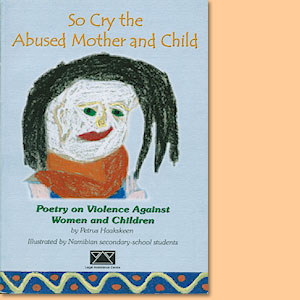Women and custom in Namibia. Cultural practice versus gender equality?, by Oliver C. Ruppel
Editor Professor Oliver C. Ruppel introduces the study Women and custom in Namibia that investigates the impact of Ccultural practice versus gender equality: The 1997 National Gender Policy stipulates that – violence against women and girls originates essentially from cultural and traditional patterns and harmful practices, language or religion that perpetuates the lower status accorded to women in the family, workplace, the community and society at large.
Violence against women and children is made worse by social pressures, women’s lack of access to legal information, aid or protection; the lack of laws that effectively and strictly prohibit violence against women and children; inadequate efforts in enforcing existing laws; and absence of educational programmes to address violence at all levels. This policy, in line with the United Nations Millennium Development Goal No. 3, namely to promote gender equality and empower women, defines the focal outset for this publication: the tension between gender equality and customary practice in Namibia. The starting point for this book was research conducted within the Human Rights and Documentation Centre (HRDC) of the University of Namibia’s Faculty of Law in 2007 and 2008. The results of the research were presented at an Expert Workshop on Women and Custom held in Windhoek on 23 September 2008.
The workshop accommodated contributions from prominent experts in the field of protecting women’s rights in Namibia, representatives from different traditional authorities, members from human rights organisations, and researchers in the women’s rights field. The workshop aimed at creating a platform for correlating the thinking of all the stakeholders regarding women and custom. The workshop as a whole and the presentation of the results of the dissertations in particular received very positive responses.
However, one specific concern was brought up by the audience several times: the results of specific research were not easily accessible to members of the public. As a result, this publication emerged. As an informative spear in the campaign to make women’s rights under customary law a national priority, the underlying research for this volume concludes that, with the advent of constitutionalism and the rule of law, many women are finally given the opportunity to create their own self-images within their respective communities and, in so doing, to overcome subordination and be on an equal footing with their male counterparts.
However, due to a lack of knowledge about their rights, the majority of women are still not in a position where they have the power of choice. Despite government efforts, the concept of gender equality is still foreign to many traditional communities; thus, women still experience discrimination in different areas. The most prominent of the identified areas of disadvantage affect women by preventing them from fully exercising their cultural, social, political and economic rights. Education has been defined as a major key to successfully overcoming the subordinate position held by women within society. Women need to be educated with regard to their constitutional rights and those guaranteed under different pieces of legislation.
The view that the law cannot dictate cultural practices, but should instead facilitate how such customs are practised, was a view shared by various participants of the workshop. In this respect, traditional authorities emphasised the need for government to recognise their customs, especially their polygynous marriages, because the non-registration of these unions created problems for surviving spouses in respect of inheritance practices. In order for a woman’s socio-economic situation to be improved, it is necessary for her to exist in an environment which is conducive to her improvement, and which will nurture and encourage her empowerment. On the other hand, traditional authorities at the workshop were adamant that they wanted the government to respect their customary practices instead of making laws that opposed them.
The opinion was also expressed that women did not consider themselves as being oppressed by their customary laws, and that they embraced these laws and practiced them proudly. For example, the practice of polygyny that is often seen as oppressive by society was embraced as a way to ensure that no children were born out of wedlock, and to ensure that all the women who formed part of the traditional community were married and could be looked after by their husband. On the other hand, from a women’s activist point of view, it was strongly emphasised that women in a traditional set-up, irrespective of their culture, were exposed to oppressive and prejudicial circumstances which severely impeded their development and financial well-being.
It was based on this premise that Women’s Action for Development (WAD) embarked on a series of actions to combat all outdated, albeit firmly embedded practices, only to realise that men living in traditional settings defended those harmful cultural practices with fervour and conviction. Moreover, women themselves, especially of the older generation, justified such practices as iconic symbols of their culture – even though those same practices had laid the foundation of their subjugation and underdevelopment. Such harmful cultural practices were instituted by men, for the convenience of men, and for the expression of power over women; furthermore, the idiosyncrasy of women who defended practices that contributed to their own detriment in the name of culture could only be the consequence of being indoctrinated over generations: stripped of an own opinion, a voice, a choice, their dignity, or any claim to human rights.
Sadly enough, mothers living in such traditional settings often become the perpetuators of a system which, if unchallenged, will become firmly embedded in rural households, and later be referred to in glowing terms as ‘cultural heritage’. Culture can strengthen and validate human rights perspectives; however, certain cultural practices may also violate human rights principles. Cultural aspects of customary law that are inhuman and discriminatory should not endanger the existence of customary law as a system of laws that governs the way of life of most Africans. The solution is not to abolish customary law, but rather to have such law ascertained. One should not be too hasty, making sweeping judgements of customary practices from the outside; rather, one should try to see the customs from the viewpoints of the people who practise them on a daily basis.
The abolition of customary law would mean erasing the modus operandi of various ethnic groups from the broad spectrum of Namibian society. Instead, one should identify the sensitive aspects under customary practices that do not conform to the constitutional principles of equality, fairness, and justice, and apply law reform. Certain conceptions of gender equality, especially in the rural areas, are often seen as ‘Western’ concepts. Indeed, some even say such concepts interfere with cultural values. This fear expresses a notion of being almost helplessly exposed to a foreign threat. The increasing process of globalisation has substantially contributed not only to a concomitantly growing recognition of cultural diversity, but also to the weakening of the ethical foundation of societies. Societies which have not developed as a part of the mainland of Western human rights experience problems in accepting these as a valid, worldwide legal perception. […]
This is an extract from the study: Women and custom in Namibia. Cultural practice versus gender equality?, by Oliver C. Ruppel.
Book title: Women and custom in Namibia
Subtitle: Cultural practice versus gender equality?
Editor: Oliver C Ruppel
Contributers: see table of content
Publisher: Konrad-Adenauer-Stiftung; Macmillan Education Namibia
Windhoek, Namibia 2008
ISBN 9789991609386
Softcover, 17x24 cm, 228 pages
Ruppel, Oliver C. im Namibiana-Buchangebot
Knowledge lives in the lake. Case studies in environmental and customary law from southern Africa
Knowledge lives in the lake: Case studies in environmental and customary law from southern Africa presents research within the framework of the international Biodiversity Monitoring Transect Analysis in Africa (BIOTA) Project.
Recht von innen: Rechtspluralismus in Afrika und anderswo
Recht von innen, Rechtspluralismus in Afrika und anderswo ist eine Festschrift zu Ehren von Prof. Dr. Manfred O. Hinz anläßlich seines 75. Geburtstages.
Women and custom in Namibia
Is so called cultural practice surpressing gender equality in Namibia? The study Women and custom in Namibia seeks for answers and perspectives.
Biodiversity and the Ancestors. Challenges to Customary and environmental law case studies from Namibia
Spans an arc between legislative efforts on regional, national and local levels and traditional ways of maintaining the environment in Namibia
Weitere Buchempfehlungen
Unravelling Taboos. Gender and Sexuality in Namibia
19 essays seek to unravel the misconceptions surrounding the concepts of gender equality, sexuality and sexual rights in Namibia
Challenging the Namibian perception of Sexuality
Ovahimba and Ovaherero cultural-sexual models in Kunene North in an HIV/AIDS context
So Cry the Abused Mother and Child
Poetry on Violence Against Woman and Children, illustrated by Namibian secondary-school students

